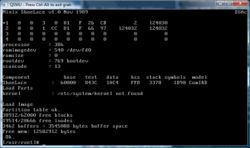Linux 0.11
From Computer History Wiki
| Linux 0.11 | |
 Linux 0.11 booted up on Qemu | |
| Type: | Multitasking |
|---|---|
| Creator: | Linus Torvalds |
| Architecture: | IBM 386 |
| This Version: | 2.6 (2010) |
| Date Released: | 1991 |
Linux 0.11 included lots of exciting additions, including the ability to run GCC natively. GCC 1.40 was made available under the name of gcclib-1.40.taz . Linux 0.11 also started the hooks for the i387 math emulator, while the file system was still restricted to only Minix file systems.
Getting this to run
So far the only place I've found with a binary is over at oldlinux.org. These images are meant to be run with an older version of Bochs.
You can download a Qemu hard disk image here
Source Code
INFO-Sheet
This is dated 12/9/1991
LINUX INFORMATION SHEET
1. WHAT IS LINUX 0.11
LINUX 0.11 is a freely distributable UNIX clone. It is almost
fully System V compatible. LINUX has been written from scratch, and
therefore does not contain any AT&T or MINIX code--not in the kernel,
the compiler, the utilities, or the libraries. For this reason it can
be made available with the complete source code via anonymous FTP.
Sorrily, it runs only on 386/486 AT-bus-machines. EISA will probably do
too, but you need an AT-Bus controller for your harddisk.
Version 0.11 is still a beta release, but it provides almost full
functionality. Various users have been able to compile bigger projects
like bison/flex by only changing the makefile to their needs, and these
tools are fully functional.
2. LINUX features
- System call compatible with V7 of the UNIX operating system
- Full multiprogramming (multiple programs can run at once)
- Memory paging with copy-on-write
- Demand loading of executables
- Page sharing of executables
- ANSI compliant C compiler (gcc)
- A complete set of compiler writing tools
(bison as yacc-replacement, flex as lex replacement)
- The gnu-born again shell (bash)
- Micro emacs
- most utilities you need for development
(cat, cp, kermit, ls, make, etc.)
- Over 200 library procedures (atoi, fork, malloc, read, stdio, etc.)
- Currently 3 national keyboards: finnish/us/german
- Full source code (in C) for the OS is freely distributable
- Full source code of the tools can be gotten from many anonymous ftp sites
(It's almost completel the GNU project)
- Runs in protected mode on 386 and above
- Support for extended memory up to 16M on 386 and above
- RS-232 serial line support with terminal emulation, kermit, zmodem, etc.
- Supports the real time clock
3. HARDWARE REQUIRED
- A 386 or 486 machine that is an AT-bus-machine. EISA will probably do
too.
- An IDE hard disk is required to use this system.
- Both 5.25" and 3.5" diskettes are supported
- At least 2 megabytes of RAM is required for LINUX to be operational,
but gcc will only work from 4 MB on.
- Any video card will do
- Up to two serial lines are supported
- The real time clock is supported
4. PARTIAL LIST OF UTILITIES INCLUDED IN OR AVAILABLE FOR LINUX 0.10
- The MTOOLS package (reading/writing to DOS)
- The complete GNU filetools (ls,cat,cp,mv,...)
- The GNU C compiler with GNU assembler,linker,ar,...
- bison
- flex
- rcs
- pmake (BSD 4.2 make)
- kermit
- Micro emacs
- less
- mkfs
- fsck
- mount/umount
5. LINUX BINARIES
The LINUX binaries (including all the tools) are available at three
anonymous FTP sites. These are:
nic.funet.fi:/pub/OS/Linux
tsx-11.mit.edu
tupac-amaru.informatik.rwth-aachen.de:/pub/msdos/replace
6. LEGAL STATUS OF LINUX
Although LINUX is supplied with the complete source code, it is
copyrighted software. But it is, opposite to MINIX available for free,
provided you obey to the rules specified in the LINUX copyright.
7. NEWS ABOUT LINUX
Since LINUX's introduction to the public there has been a rapidly
growing mailing list, "linux-activists@joker.cs.hut.fi". To subscribe
to this list, mail to "linux-activists-requests@joker.cs.hut.fi". If
the traffic in this lists increases further, there are plans to swap
(at least partially) over to comp.os.misc, so watch out for any LINUX
articles in this group. If you simply want to know whats the current
state of the art, do a "finger torvalds@kruuna.helsinki.fi", and you'll
get some information.
8. FUTURE PLANS
The major current project is bringing LINUX to a version number
greater than 1.0. It has also to undergo some (minor) revisions to be
compatible to the IEEE POSIX P1003.1 and P1003.2 standards. Various
people are currently working on
- math support/fp emulation in the kernel
- Page swapping (since paging is alreay implemented)
- A virtual filesystem layer
- STREAMS
If you want to join the developers, join the mailing list